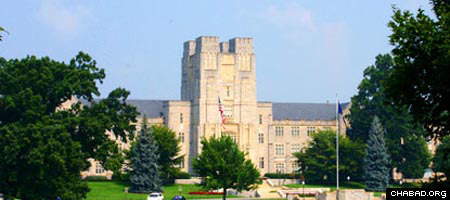When Chabad-Lubavitch Rabbi Elazar and Rivkah Bloom followed the news reports of the tragedy at the Virginia Polytechnic Institute and State University in Blacksburg, Va., they hurt. For the victims, for the community, for the school.
With the beginning of classes this month, the co-directors of the new Librescu Chabad Student Center, supported in part by a generous grant from the Rohr Family Foundation, see themselves as a crucial part of the healing process.
Jewish students on Virginia Tech's campus – which was traumatized by a student's April 2007 shooting spree that left 32 dead, including beloved engineering Professor Liviu Librescu – have been welcoming the Bloom family of five and the new Chabad House, with open arms.
The leadership of the campus Hillel, established four years ago, is also looking forward to working with the Blooms. Rather than seeing a new Chabad House as competition, Rob Goldberg, Hillel International's vice president for campus involvement, said that the organization recognizes Chabad as a great way to promote Jewish involvement among students.
"We recognize a wide variety of students," said Goldberg, who works closely with the organization's Virginia Tech operation. "Today, more than ever we've been enjoying a relationship with Chabad that's unique and special."
Graduate student Amanda Veazey was thrilled by the Blooms' coming to the school.
"Chabad needs to come to Virginia Tech because we need" more opportunities for Jewish life on campus, said Veazey, a second-year masters student. "Rabbi Bloom and his family will be welcomed at VTech. They're a young family with a good attitude."
That attitude combines an emphasis on traditional Jewish values with a youthful spin on things. The rabbi is just 31-years-old and Rivkah Bloom is 25; they're experienced enough to share life stories and young enough to relate to students. In fact, the Blooms, who, like most students at Virginia, studied science in college, are just as likely to answer questions about Judaism as they are about boyfriends, girlfriends and classes.
"This is an ideal situation for a young family," said Rivkah Bloom, who holds bachelors and masters degrees from the Massachusetts Institute of Technology. "I was a student on campus, and I understand the issues that they're dealing with."
"It's not so far off," agreed Elazar Bloom. "We're on the same page with most things. The fact that I have a little more Jewish knowledge is something I can share as a friend. You can tell we're on the same page."
Veazey agreed.
"From the Orthodox family that I have, whenever I think ‘rabbi,' I think of a 90-year-old guy with a thick Yiddish accent," explained Veazey. "Somebody who's young and has an iPod, that helps. It shouldn't be the only reason students come to Chabad, but it's a lot easier to relate to somebody our age."
Connecting With Students
On this campus, at this time, the Blooms' ability to connect with students comes at a premium. They join an emotionally fragile campus, the likes of which – outside of maybe the Columbine High School outside of Denver, Colo., that experienced a similar massacre in 1999 – has never been seen. Their shared job is one part teachers, one part counselors, one part friends.
Back in high school, while touring the sites of Nazi concentration camps in Europe, the rabbi encouraged his distraught friends to transform darkness into light.
"When I was in high school, I went on a trip called the March of the Living," said Bloom. "I talked to juniors and seniors all around the world while seeing the concentration camps. It was a very intense experience. Some of the places at the camps are completely in place, and I'm the grandchild of Holocaust survivors on both sides.
"In some way, I realized then that there's no other response to such a situation than to say that this is going to be a challenge, and the community needs rebuilding," he continued. "You have to take something from the destruction. You'll find, just like Jews have found rebuilding from the Holocaust, that the knot is stronger."
"That's how we see Virginia Tech," echoed Rivkah Bloom. "It's going to be hard work, a tremendous challenge, but there's never been a campus like this. G‑d willing, there never will be again."
Indeed, the tragedy of the shooting hangs heavy over the Blooms' mission. The Chabad House is named after Librescu, who sacrificed his life blocking the door to his classroom so that students could flee while the shooter fired from the other side. The family permitted the use of the name.
But, the biggest challenge, admits the rabbi, will be encouraging the estimated 1,500 Jewish students to get involved Jewishly.
"There's a Jewish community here, but it really is very small" in terms of involvement, said Micah Nardi, a senior studying psychology. "For high holidays, you have maybe 150 students. It's kind of hard to be Jewish here.
"There are a lot of students who don't get involved with Jewish life on campus," he added. "I think Chabad will bring the Jewish community more together."




Start a Discussion